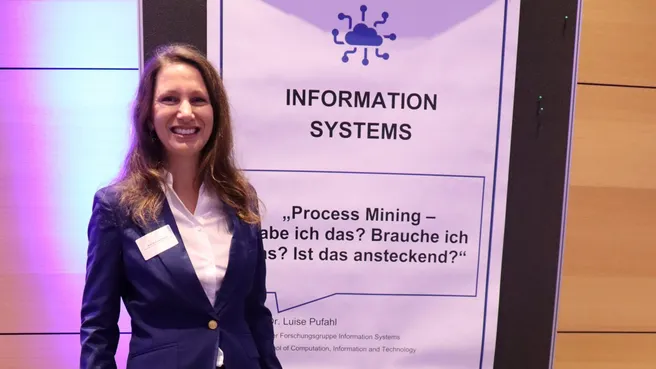The two managing directors of the host TUM Campus Heilbronn, Professor Helmut Krcmar and Daniel A. Gottschald, emphasized in their opening speech: "We want to connect you not only with the university, but also with each other. The spirit of the region is evident on evenings like this". For the fourth time, the TUM Connect event series also offered participants the chance to become experts themselves, share their experiences and speak up – which many of them did during the course of the event.
The concept of the event was based on the Speakers' Corner in London's Hyde Park. Instead of boxes or stepladders, small podiums offered participants the opportunity to be seen and heard. As every year, there were several thematic focuses and the foyer of the auditorium was divided into different areas, between which participants could move or stay as they wished.
New opportunities
While Prof. Helmut Krcmar spoke in his corner about the "Skilled workers of the future", Luise Pufahl, Professor of Information Engineering at the TUM Campus Heilbronn, delved into the world of "Process Mining". Her three key questions were: "Do I have this? Do I need this? Is it contagious?" Process Mining is a technology that is used to discover, monitor and improve real processes. To this end, knowledge is extracted from event logs that are created during the execution of these processes – a previously unknown world for many of the participants. The professor explained how important data is and why.
This is precisely the aim of TUM Connect and demonstrates the added value of this interactive and low-threshold format. Participants can break down initial inhibitions, reflect together on initial potential applications and benefit from ideas for their own company. "The participants in the discussion now know the basics. In the discussion, we discussed areas of application for process mining and what needs to be considered," said Luise Pufahl. For the professor at the School of Computation, Information and Technology, this exchange is an important indicator of where companies currently stand and what they need from science and knowledge transfer.
Developing solutions together
Other topics, such as "Agile team development and innovation processes" with Dr. Karl Rabes and the importance of narratives in digital transformation processes with Dr. Christoph Geier, rounded off the evening.
Overall, TUM Connect showed that despite the ongoing challenges in the digitalization of processes and products, the exchange and integration of science and practice were essential. Such events serve to find solutions, learn from experience and make effective use of the latest scientific findings.
